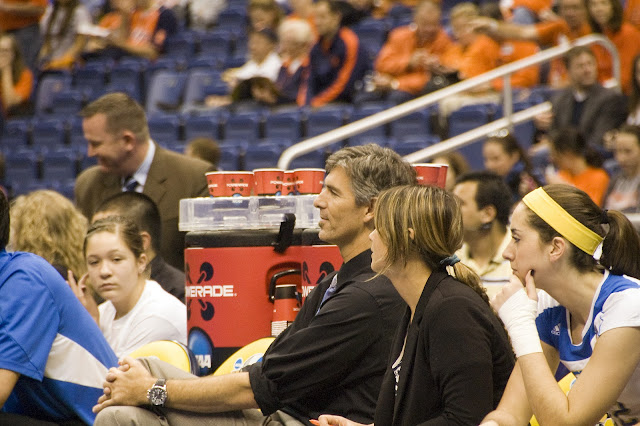By Terry Wood
Special to Volleyblog Seattle
Washington volleyball coach Jim McLaughlin wants to
clarify one of his comments included in a Seattle Times report regarding the
departure of freshman outside hitter Summer Ross. (Summer Ross transfers from Washington volleyball team, December 28)
Ross, an international beach volleyball junior champion,
transferred out of UW in December after one indoor season at Washington in
order to focus on sand volleyball.
During an interview last week for The Times report,
McLaughlin mentioned, "At one point she wanted to come in late to training
to allow her to play on the beach, and I said no,
unless we redshirt you. You've got to be here for the team. We can't have a kid
coming in at the end of August. (UW started fall practice Aug. 7.) We need to
train."
 |
| Jim McLaughlin [Volleyblog Seattle photo by Leslie Hamann] |
Following the report’s publication, McLaughlin says the
excused absence Ross was seeking was more precisely a five-day span, Aug. 30-Sept. 4, to play in the FIVB Beach Junior World
Championships in Halifax, Nova Scotia. She won that event with partner Tara
Roenicke in 2010 in Alanya, Turkey.
The Huskies opened their 2011 season Aug. 26-27 with
three matches at the Long Beach State Mizuno Invitational, then played three
matches Sept. 2-3 in Spokane, Wash., at the Northwest Challenge, hosted by
Gonzaga. The Gonzaga matches conflicted with the world championship dates.
McLaughlin says he understands attempting to play indoor
and outdoor is a challenge for any volleyball athlete. Ross, he believes, gave
it her best shot. “Summer enrolled early at Washington and trained with us in
the spring (2011) quarter,” he says. “She put in a lot of work, and she’s very
talented.
“But when the indoor season is on, we need every player
to be totally committed to it. She’s a great kid, and we’ll miss her
contributions, but she’ll be able to focus full-time on the beach game now, and
that’s a good deal for her.”
Terry Wood is a freelance writer who regularly
contributes to The Seattle Times.
_______________________
Volleyblog Seattle has made initial efforts to contact Summer Ross and her family for comment.






















